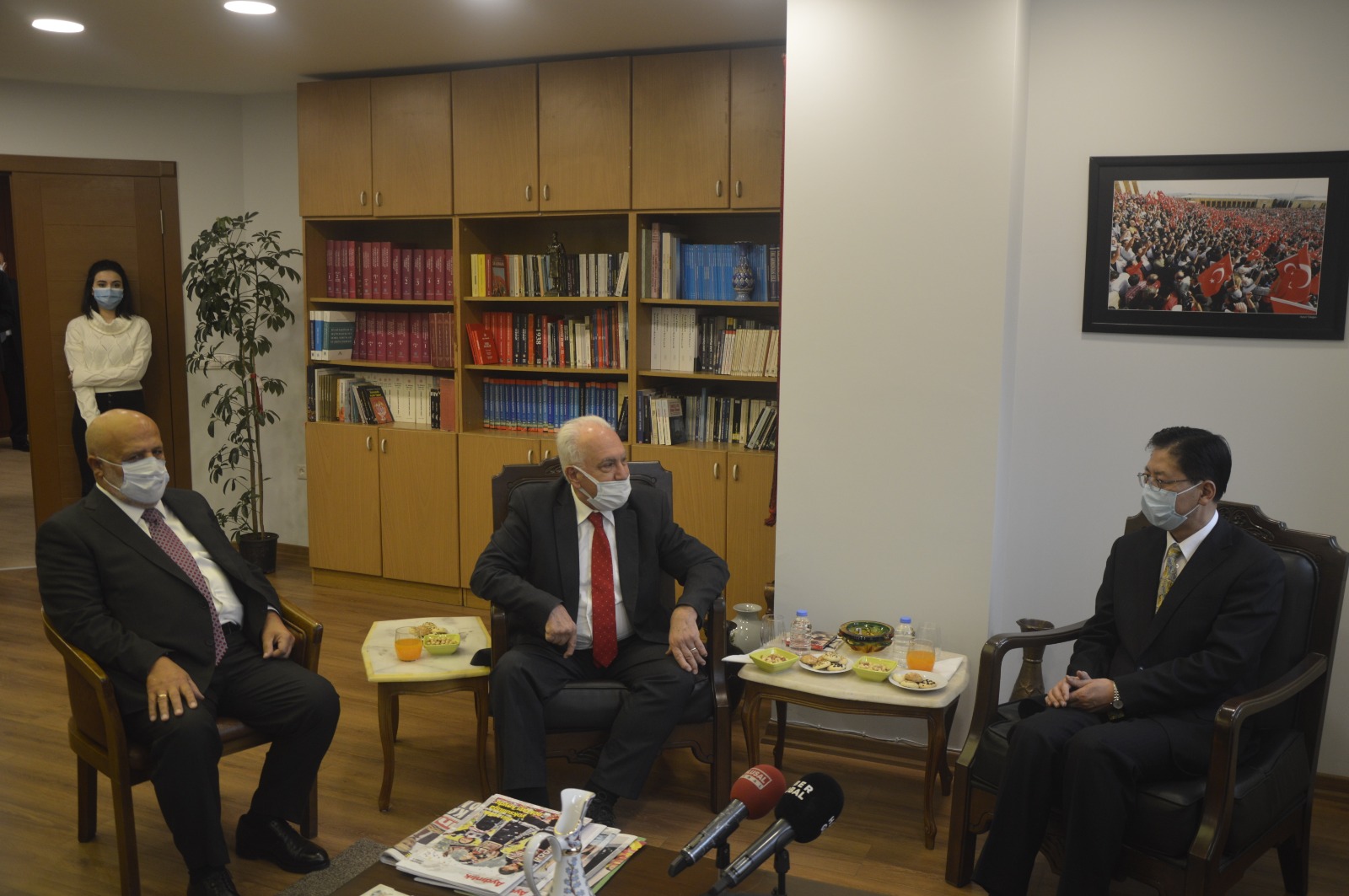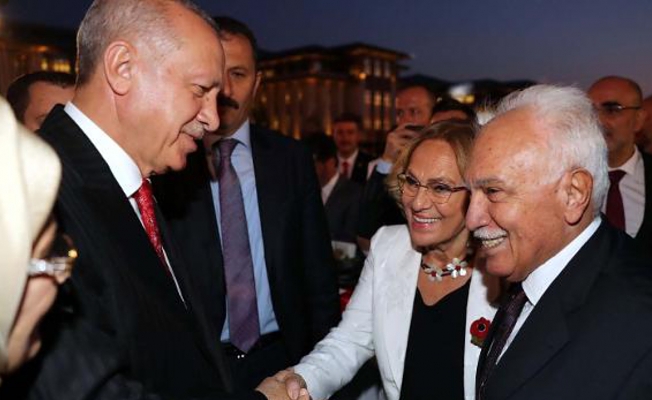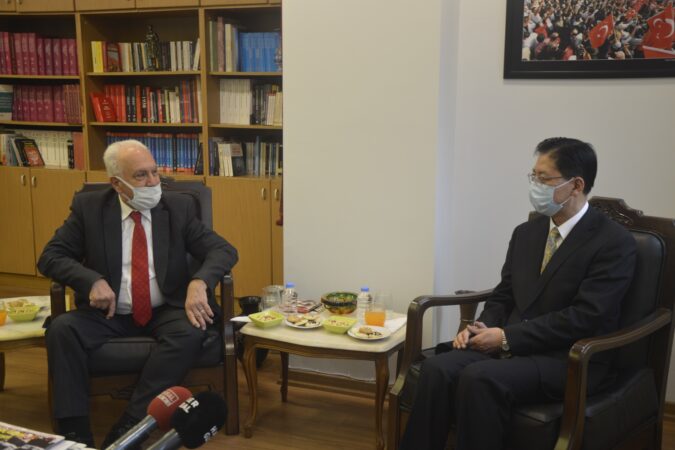Nordic Monitor
President Recep Tayyip Erdoğan’s neo-nationalist (Ulusalcı) ally Doğu Perinçek, leader of the Homeland Party (Vatan Partisi), is the first Turkish politician to have been visited by the newly appointed Chinese ambassador to Turkey.
Ambassador Liu Shaobin presented his letter of credence to President Erdoğan on December 15 and officially started his tenure in Turkey. Three days later, on December 18, he visited Homeland Party headquarters and met with Perinçek, who regularly visits China to lobby for the Turkish government and attends events organized by the Chinese Communist Party.
Ambassador Shaobin previously served as director-general of the department of external security affairs at the Chinese foreign ministry, the Turkish presidency said in a press release.
Perinçek was accompanied to the meeting by Ethem Sancak, a former Maoist and businessman who owns armored vehicle manufacturer BMC, the Homeland Party’s media outlet, Aydınlık, reported. The meeting revealed Perinçek’s efforts to find alternative Chinese partners for his ex-comrade Sancak’s defense industry projects, which face significant delays over the denial of engine technology by European firms.
Sancak and Perinçek were together in the violent, revolutionary, Maoist Aydınlık movement between 1975 and 1985. Sancak later left the organization like many prominent figures who did not go along with Perinçek.
Sancak, a businessman who sits on the ruling Justice and Development Party’s (AKP) executive board, has been an important figure in the Turkish defense industry since 2014. The Savings Deposit Insurance Fund (TMSF) handed over vehicle maker BMC to his company in 2014. Weeks later, he sold nearly half (49 percent) of the company’s shares to the government of Qatar.
Since then, the company has enjoyed a steady stream of contracts from the Turkish government and won the contract to build Altay tanks in a tender with competitor Koç Holding, the conglomerate that built the prototype of the tanks. Then, a tank and pallet factory belonging to the Turkish military was also transferred to BMC for 25 years by Erdoğan in January 2019.
Perinçek’s Homeland Party is electorally insignificant and received 0.23 percent of the vote in the general election, but it is home to several former generals who hold leading positions in it. His neo-nationalist “Eurasian” ideology benefits from the downturn in Turkey’s relations with the Western powers and espouses an anti-Western approach in foreign policy and ultranationalist sentiment in domestic politics.

The Homeland Party has brought together Turkey’s prominent businessmen at conferences focusing on Turkish-Chinese cooperation in production and investment opportunities and has regularly organized events, some of them in China. Perinçek’s China representative, Adnan Akfırat, sponsored an event in honor of Sancak at Shanghai University in 2017.
Perinçek and his party members have often accused militant-turned-businessman Sancak of being a comprador and a capitalist, calling him a turncoat who sold out his friends.
During the trials concerning Ergenekon, a clandestine organization that was accused of plotting against the Turkish government, Sancak’s media outlets turned against the jailed Perinçek and his party members, between 2008 and 2013. Sancak himself was a witness in the trial and testified that he was pro-democracy and uncompromisingly against organizations like Ergenekon.
Perinçek became an ally of the embattled Turkish president in the aftermath of massive graft investigations into government officials in 2013. Following a coup attempt on July 15, 2016, he announced the formation of a “common patriotic front” with the “religious conservatives.” Neo-nationalist influence in major sectors of Turkey from the bureaucracy to the judicial system and from the state administration to the military and the media started to increase as a result of his alliance with Erdoğan.
Perinçek’s Workers and Peasants’ Party of Turkey (TIKP) was listed as a Maoist terrorist organization by the Central Intelligence Agency (CIA) in a September 1984 intelligence report along with the recognition of Perinçek as the leader of the group under “Turkey’s major terrorist group.”

The Turkish government and Turkish-Qatari joint venture BMC signed a multibillion-dollar contract in November 2018 for the production of 250 Altay tanks. But BMC has not delivered the tanks to the Turkish Armed Forces due to the denial of engine technology by European firms. BMC was planning to power the Altay with the German MTU engine and RENK transmission but did not receive the German products as a result of objections to technology transfer from Germany.
According to DefenseNews, BMC has been in talks with Hyundai Rotem to solve the problems surrounding the missing foreign technology for the Altay, and in indirect talks, through Hyundai Rotem, with two South Korean defense technology concerns: engine-maker Doosan and S&T Dynamics, which produces automatic transmissions.
Sancak’s presence at Perinçek’s meeting with Chinese Ambassador Shaobin reveals the fact that BMC is relying on the Homeland Party’s assistance to access Chinese technology that might solve its chronic engine problem.












